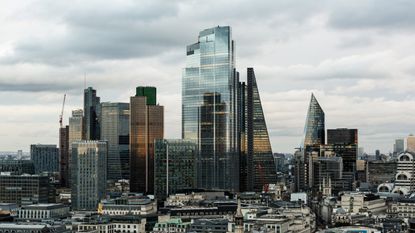FTSE 100 closes at another record high
The FTSE 100 has closed at another record high, but what’s driving the index’s performance and can the rally continue?


The FTSE 100 closed at another record high today at just over 8,010.
While other stock markets around the world have been struggling recently, the FTSE 100 has been charging ahead due to its heavy weighting towards resource stocks.
The weak pound has also helped boost sentiment towards the index. More than two-thirds of the index’s profits are earned outside the UK, meaning their earnings are worth more when translated back into sterling after the currency’s recent weakness.
Subscribe to MoneyWeek
Subscribe to MoneyWeek today and get your first six magazine issues absolutely FREE

Sign up to Money Morning
Don't miss the latest investment and personal finances news, market analysis, plus money-saving tips with our free twice-daily newsletter
Don't miss the latest investment and personal finances news, market analysis, plus money-saving tips with our free twice-daily newsletter
According to Jason Hollands, managing director of Bestinvest, the record is due a combination of "today’s better-than-expected inflation figures aided by a weakening of the pound versus the dollar, as the highly international companies in the FTSE 100 have significant dollar earnings exposure so the currency conversion effect benefits them. In fact, FTSE 100 stocks earn more of their revenues in the US, than they do in the UK."
BP helps the FTSE 100 hit a record
A strong performance from oil and gas companies, as well as mining stocks, has helped drive the index higher over the past few weeks.
Last week, BP announced a record profit, following Shell, which also announced record profits the week before.
Another strong performer has been the global mining and commodity trading powerhouse Glencore. Shares in this business have returned nearly 20% over the past year.
And on the day the FTSE 100 hit a new record, the mining giant and commodity trader unveiled a record $34bn in profits for 2022.
More than half of those earnings came from its coal-mining business. EBITDA at Glencore's coal arm more than tippled year-on-year.
By far and away the best-performing stock over the past year is the defence contractor BAE Systems. Excluding dividends, investors the stock has returned 44% over the past 12 months. Including dividends, the stock has returned around 50%.
“The FTSE 100 has long been criticised for its lack of technology giants. However, in 2022 this proved to be a positive, allowing the UK index to avoid the ‘tech wreck’. Its favourable sectoral mix of energy giants and banks helped the FTSE 100 outperform in 2022,” says Scholar
Does this mean it’s time to buy the FTSE 100?
The FTSE 100 index is a global index, and, as such, is not necessarily an indicator of UK economic performance.
That could mean it’s a good investment for those seeking to broaden their international exposure at a time when the outlook for the UK economy isn’t too bright.
What's more, despite its recent high, the index still appears cheap.
“Despite the new high for the index, UK equities remain incredibly cheap with the FTSE 100 trading at a multiple of 10.7 times forecast earnings. This is low both compared to longer-term trend and it is also one of the widest discounts to the rest of the world in living memory. This is a good starting point, indicating the potential for further gains, while UK shares also provide an attractive level of dividend yield at circa 4.0%," says Hollands.
“In recent years, many investors have dismissed UK blue chip shares as ‘boring’, lacking exposure to exciting sectors like technology and social media. But in a more trying economic environment, solid companies churning out reliable dividends are well worth considering. Boring is the new sexy. With an abundance of exposure to energy, commodities, consumer staples and healthcare companies, the FTSE 100 looks well placed for the current environment.”
The long road to 8,000
It has taken the FTSE 100 index eight years to rise 1,000 points from 7,000 to 8,000, but “this is nothing compared to the time taken to climb from 6,000 to 7,000” notes Laith Khalaf, head of investment analysis at AJ Bell.
It took 17 years for the index to close this gap, a gain of 16.7%. In comparison, it took just seven months for the index to rise 20% from 5,000 to 6,000, which it hit in April 1998.
“It’s fair to say this period also skews the figures somewhat, but it’s also important to note that each subsequent 1,000 point advance marks a progressively less impressive price appreciation for the index,” says Khalaf.
“The first 1,000 point climb from 1,000 to 2,000 required a doubling in the price of the index. The move from 7,000 to 8,000 represents a jump in the FTSE 100 of just 14.3%, which translates into a compound capital return of just 1.7% a year for the last eight years. Not a slap in the face when you consider that doesn’t include dividends, but hardly a stellar performance either.”
However, including dividends, the index has produced a far better performance for investors.
The FTSE 100: the income index
The headline FTSE 100 figure doesn’t include dividends, which, considering the fact that dividends play such an important part of the UK market, is misleading.
“While this doesn’t affect the FTSE 100 too much over shorter time frames, over the longer term the gains made by the FTSE 100 significantly undershoots the return made by investors,” says Khalaf.
It has taken the FTSE 100 eight years to rise from 7,000 to 8,000, a return of 14.3%. Including dividends, the index has produced a total return of 50%. Over the past decade, the index has yielded a total return of 83.2%.
So, as Khalaf explains, “while the headline FTSE 100 index is a perfectly good measure of day-to-day market movements, investors shouldn’t be fooled into thinking it’s an accurate reflection of long-term returns from the stock market.”
Rupert is the Deputy Digital Editor of MoneyWeek. He has been an active investor since leaving school and has always been fascinated by the world of business and investing.
His style has been heavily influenced by US investors Warren Buffett and Philip Carret. He is always looking for high-quality growth opportunities trading at a reasonable price, preferring cash generative businesses with strong balance sheets over blue-sky growth stocks.
Rupert was a freelance financial journalist for 10 years before moving to MoneyWeek, writing for several UK and international publications aimed at a range of readers, from the first timer to experienced high net wealth individuals and fund managers. During this time he had developed a deep understanding of the financial markets and the factors that influence them.
He has written for the Motley Fool, Gurufocus and ValueWalk among others. Rupert has also founded and managed several businesses, including New York-based hedge fund newsletter, Hidden Value Stocks, written over 20 ebooks and appeared as an expert commentator on the BBC World Service.
He has achieved the CFA UK Certificate in Investment Management, Chartered Institute for Securities & Investment Investment Advice Diploma and Chartered Institute for Securities & Investment Private Client Investment Advice & Management (PCIAM) qualification.
-
-
 Investment trust discounts hit 2008 levels. Here’s how to profit
Investment trust discounts hit 2008 levels. Here’s how to profitInvestment trust discounts have risen to levels not seen since 2008, here are three trusts looking to buy to profit.
By Rupert Hargreaves Published
-
 A luxury stock to buy at a high street price
A luxury stock to buy at a high street priceInvestors wrongly consider Watches of Switzerland a high-street outlet.
By Dr Matthew Partridge Published
-
 Investing in wine: how Cru Wine is reaching new audiences
Investing in wine: how Cru Wine is reaching new audiencesTips Gregory Swartberg, founder of fine wine specialist Cru Wine, talks to Chris Carter about how to start a wine collection
By Chris Carter Published
-
 Small companies with big potential
Small companies with big potentialMichael Taylor of Shifting Shares reviews his 2023 picks and highlights more promising minnows.
By Michael Taylor Published
-
 The MoneyWeek portfolio of investment trusts – July 2023 update
The MoneyWeek portfolio of investment trusts – July 2023 updateTips A decade ago we set up the MoneyWeek portfolio of investment trusts. They remain a compelling long-term bet says Rupert Hargreaves
By Rupert Hargreaves Published
-
 Women lead the way with ethical investments
Women lead the way with ethical investmentsDemand for more ethical investments has soared – and women are more likely to opt for them. Annabelle Williams, personal finance specialist at Nutmeg, takes a look at why.
By Annabelle Williams Published
-
 BoE: Mortgage payments to rise by £220 a month for households
BoE: Mortgage payments to rise by £220 a month for householdsMillions of households can expect a mortgage spike of around £200 a month - and some may even reach a extra £1,000 a month, the Bank of England warns
By Marc Shoffman Published
-
 What happened to Thames Water?
What happened to Thames Water?Thames Water, the UK’s biggest water company could go under due to mismanagement and debt. We look into how the company got itself into this position, and what investors should expect.
By Simon Wilson Last updated
-
 Where to invest in the metals that will engineer the energy transition
Where to invest in the metals that will engineer the energy transitionA professional investor tells us where he’d put his money. This week: John Ciampaglia, manager of the Sprott Energy Transition Materials UCITS ETF.
By Nicole García Mérida Published
-
 How investors can profit from high food prices
How investors can profit from high food pricesThe latest furore over grocery prices will die down, says David Stevenson. But the long-term outlook for soft commodities remains bullish. These are the stocks investors can buy to profit from high food prices.
By David J Stevenson Published









